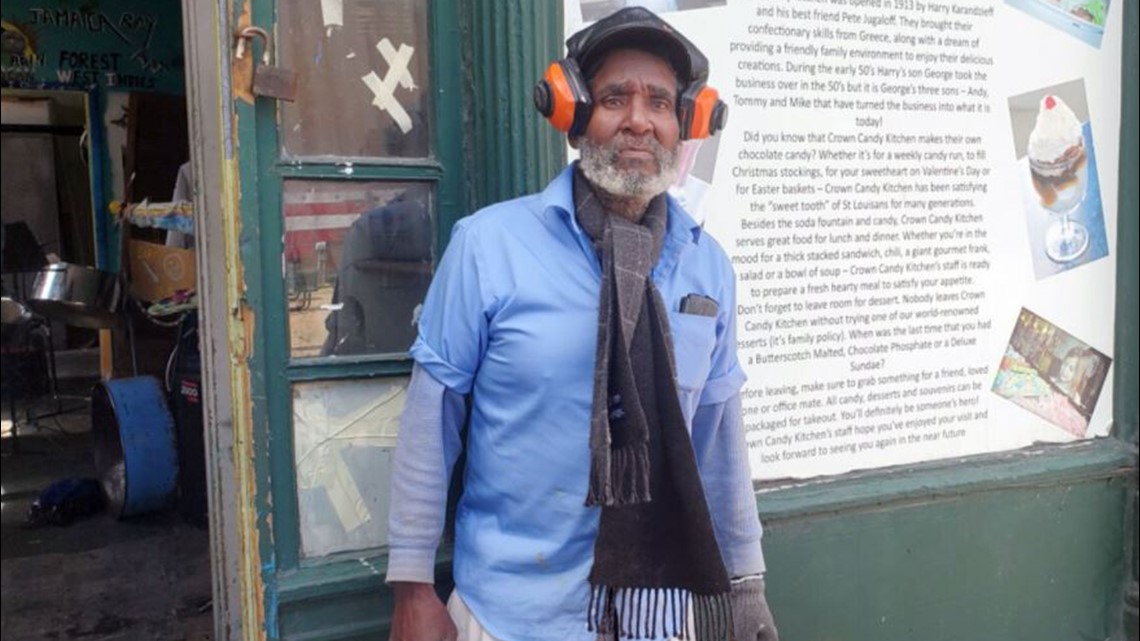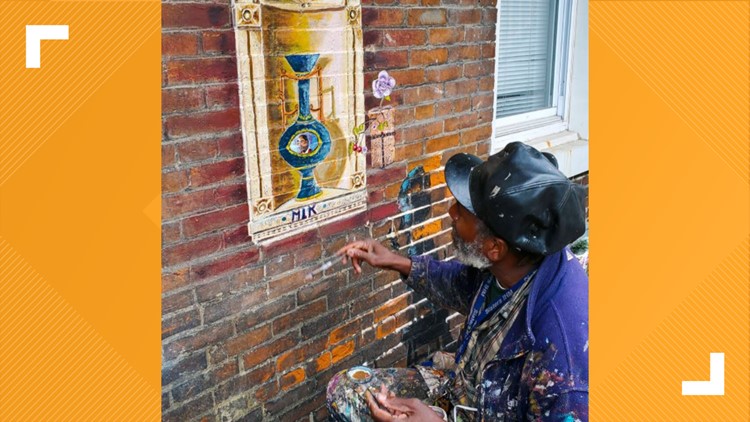ST. LOUIS — Jamaica Ray braves COVID and cops to make his art and music.
This story was produced in partnership with the Pulitzer Center as part of the 63106 Project, a St. Louis-based non-profit racial equity storytelling project.
“Oh, oh.”
Jamaica Ray kept an eye on the patrol car slowly rolling down the alley where he was working. The cruiser backed up and stopped in front of the metal fence where Ray knelt in the back yard.
The artist and musician is well known as the man who plays steel drums in front of the iconic century-old Crown Candy Kitchen. Since the spread of the new coronavirus early this year, Ray has been working elsewhere. On this day he was painting elaborate, tropical and cultural images on the exterior of a historic two-story building in the Old North neighborhood.
The window of the cruiser slid down. The officer inside asked, “Can we talk with you a minute?” Ray remembered thinking: “Oh s**t. Here we go.”
He wasn’t doing anything wrong, just painting a wooden pole on his lap that would soon host a colorful bird house. But he realized, sitting on the ground, he might look suspicious.
“Jamaica, is that you?”
Turns out a policeman was showing a new female recruit the neighborhood, and he recognized Ray from Crown Candy. The encounter ended pleasantly with Ray giving the officers a tour of the building and his work. As they parted, the policeman wished Ray a quick return to the restaurant once the virus is under control.
That may be awhile. Crown Candy, like many other restaurants, has reopened, but without nearly as many customers as it had pre-pandemic.
Jamaica, the Rastafarian artist, has been working on his mannequins and building his steel drum sets inside his cubby next door Crown. But because of the virus, he’s neither playing nor mingling with waiting customers as he used to do.
Even so, Jamaica said, “Life is still “100% tropical. In my mind, it’s always palm trees and 90 degrees outside. I may not be there visually, but I’m there mentally.”
Life may be copacetic in his head but his predictions about the surging pandemic and the upcoming election betrayed his calm, detached demeanor. “We haven’t seen the worst yet,” he said. “It’s going to get bad, Mon.”
This season will be the first real “COVID winter,” Ray predicted.
“The pandemic started at the end of a mild winter,” Ray said. “Last year, when it hit, I was outside of Crown with just a jacket on. This winter ain’t gonna be no joke. And I think it’s going to be worse.”


Last year in the U.S., there were 40 times as many flu cases in the fall and winter as in the previous spring and summer. Influenza colliding with a surging coronavirus pandemic is a lose/lose scenario. The symptoms of the flu and COVID-19 are similar. Outbreaks of both simultaneously could overwhelm hospitals, doctor offices and laboratories that test for both respiratory illnesses.
Ray and his neighbors may be particularly vulnerable. They live in 63106, a zip code that has been identified as ranking last in our region for social determinants of health. Based on data from the 2010 census and the St. Louis Department of Health, the life expectancy of a child born in 63106 is 67 years old, compared to 85 years old in 63105 – that would be Clayton, the St. Louis County seat located six miles west of 63106. And that was before the pandemic.
Ray said he has none of the underlying medical conditions like heart or lung disease or diabetes that place older citizens at a higher risk for developing more serious complications from COVID-19. Still, he has no health insurance. Instead, Ray relies on the services of Gateway to Better Health, a temporary health care program for uninsured adults in the city and county. At 63, he isn’t yet eligible for Medicare.
Ray’s other concern is an outbreak of violence after the election. “I think something’s going to happen that the police won’t be able to handle,” he said.
Politics, as far as Ray is concerned, is a reflection of human nature:
“Man gonna be man, mon,” he said. “Man is like an animal with a brain. It’s a concrete jungle out there, and nothing’s going to change that.”
Ray can’t influence the pandemic or politics, but he can control his destiny. So as the coronavirus surges, he still practices social distancing, survives off his monthly social security checks, and is still getting around on his dependable, silver and blue Northwoods Pomona bicycle. That, however, is about to change.
Ray hasn’t driven a car since he came to St. Louis in 2013 to care for his dying father. He recently passed his driver’s test and plans to purchase a vehicle when and if the next round of stimulus checks passes through Congress. With a large van, he’ll soon be able to fully practice what he defines as “his first love”: music.
“People think I’m a street musician, but I never played on a corner until I came to St. Louis,” he said. Ray, who plays keyboards, guitar and an array of drums including steel drums, said he was an in-demand musician in California before he returned to his hometown. He performed reggae music with local bands or did private gigs for famous sports figures like basketball great Dennis Rodman.
Once he’s mobile, Ray said, ““I won’t be turning down gigs anymore.”
A native St. Louisan, Sylvester Brown Jr. has been a journalist and social justice advocate since 1987. Along with working on the 63106 Project, Brown has joined the St. Louis American as its inaugural Deaconess Fellow. The fellowship is funded by the Deaconess Foundation as part of its support for Black-led COVID-19 relief efforts.
Before Ferguson Beyond Ferguson, a nonprofit racial equity project, is telling the story of families in 63106 one by one over the course of the pandemic. This is the second chapter in Jamaica’s Ray’s life. Reporter Sylvester Brown will be following the challenges he faces until the pandemic abates. The St. Louis American is one of several St. Louis media outlets that have published stories as part of the project. You can find an archive of the stories at https://beforefergusonbeyondferguson.org/63106-project/.


